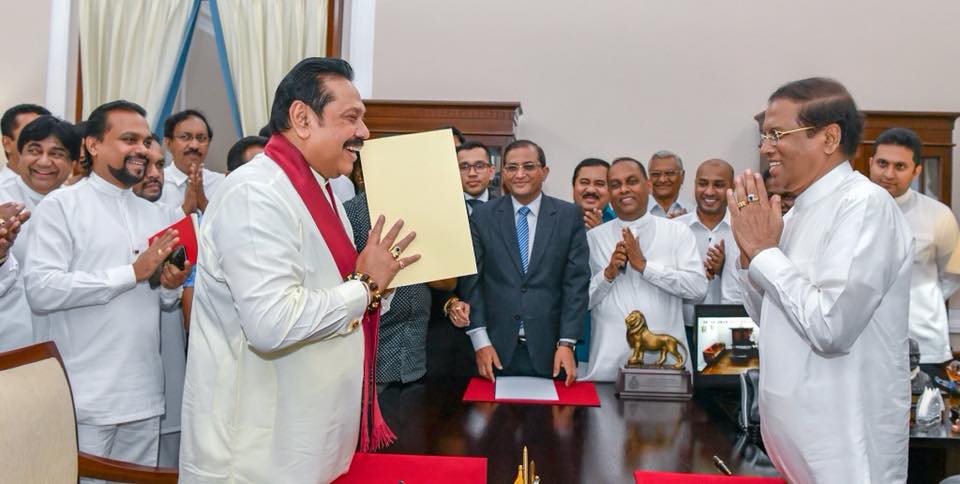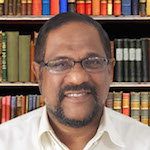A Brief Colonial History Of Ceylon(SriLanka)
Sri Lanka: One Island Two Nations
A Brief Colonial History Of Ceylon(SriLanka)
Sri Lanka: One Island Two Nations
(Full Story)
Search This Blog
Back to 500BC.
==========================
Thiranjala Weerasinghe sj.- One Island Two Nations
?????????????????????????????????????????????????Wednesday, October 31, 2018
Constitutional Coup Or Crisis – Questions & Answers


The announcement of the appointment of Mr. Mahinda Rajapaksa as the
Prime Minister and the removal of the sitting Prime Minister Mr. Ranil
Wickremesinghe last Friday, 26 October 2018 was a shock to the nation. All are now talking about politics, law and democracy. The
partisans on either side of the divide are calling the removal and
appointment as constitutional while the other side is screaming that it
is unconstitutional. There
is another lot who unable to distinguish between what is political and
legal are swimming against the current adding to the confusion. It is surprising to see some who are considered to be ‘legal experts’ also in this lot.
My interest in writing this column has to be explained. Firstly, I must
confess that I have no political affiliation or inclination towards
either of our defacto and dejure Prime Ministers or their respective
parties. Secondly, my allegiance is to democracy and democratic principles. I am aware that these values have received a battering in our country nevertheless, we must all cling on to it.
Looking around, I find many people in a state of uncertainty unable to understand the constitutional legality of the matter. With this in mind, I developed a question and answer approach to the issue to help the average person understand. In certain places, I have provided an opinion of my own.
Question No. 1: What are the duties and powers of the President in the Constitution?
Answer: Article 33. (Relevant excerpt). The duties in relation to the Constitution is stated as follows:
“(1) It shall be the DUTY of the President to –
(a) ensure that the Constitution is respected and upheld;”
(2) The President shall have the POWER –
“(h) to do all such acts and things, not inconsistent with the
provisions of the Constitution or written law, as by
international law, custom or usage the President is authorized
or required to do.”
Article 33. (1) is simple and very clear. As far as 33 (2) is concerned, the President has no power to act contrary to the constitution. If he acts in such a manner, can that be argued to be abuse of power?
Question No. 2: Does a citizen have the duty to defend the Constitution?
Answer: YES. Article 28. states in relation to Fundamental duties:
“It is the duty of every person in Sri Lanka –
(a) to uphold and defend the Constitution and the law;”
Therefore, it is a fundamental duty of every person to defend the constitution.
Question No. 3: What is a National government?
Answer: Article 46. (5). “National
Government means, a Government formed by the recognized political party
or the independent group which obtains the highest number of seats in
Parliament together with the other recognized political parties or the
independent groups.”
Question No. 4: What are the salient features of this Article 46. (5) on national government?
Answer: The salient features are:
- Formation of a government
- By the Party which has highest number of seats
- Together with other political parties or independent group
Question No. 5: Who is eligible to form a National government?
Answer: Article 46 (4). (Relevant excerpt). “The recognized political party which obtains highest number of seats in Parliament forms a National Government.”
Question No. 6: What does the constitution provide in a situation where a political party pulls out of the National government?
Answer: The constitution does not provide for this because common sense shall prevail. The National government is formed at the call of the party which has the highest number of seats in Parliament. If
any party pulls out of the government, the government shall continue so
long as the party which has the highest number of seats can demonstrate
its majority in parliament.
Question No. 7: What is the relevance of the National government to the Cabinet of Ministers? Why is it relevant?
Answer: The relevance of the national government to the cabinet of
ministers is only with regard to the increase in number of Ministers in
the Cabinet under a national government and, nothing else.
Article 46. (4). (Relevant excerpt). “where
the recognized political party which obtains highest number of seats in
Parliament forms a National Government, the number of Ministers in the
Cabinet of Ministers, ……. , shall be determined by Parliament.”
Why it is relevant is because if it is a non-national government under
Article 46 (1) (a) and (b) the number in the Cabinet of Ministers shall
not exceed 30 and 40 respectively. In
the case of a national government an exception to this made by Article
46 (4) where the parliament shall determine the number in the Cabinet of
Ministers.
Question No. 8: Can the numbers in the Cabinet of Ministers change?
Answer: Yes, it can. Article 43. (3) (Relevant excerpt). “The President may at any time change the composition of the Cabinet of Ministers.”
Question No. 9: Does any change in the composition of the Cabinet of Ministers dissolve the Cabinet?
Answer: No. It does not dissolve.
Article 43. (3) (Relevant excerpt). “Such changes shall not affect the
continuity of the Cabinet of Ministers and the continuity of its
responsibility to Parliament.”
Question
No. 10: Is it correct to say that the cabinet stands dissolved because a
party or parties have pulled out of the national government?
Answer: It is not correct. The Cabinet is a vital government organ. Even
when the Parliament is dissolved the Cabinet shall continue as per
Article 47. (1) “The Cabinet of Ministers functioning immediately prior
to the dissolution of Parliament shall, notwithstanding such
dissolution, continue to function..”

